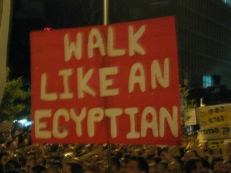bio
“Walk like an Egyptian” – Several Cities, One Struggle?
“The suburbs dream of violence. Asleep in their drowsy villas, sheltered by benevolent shopping malls, they wait patiently for the nightmares that will wake them into a more passionate world…” That is the beginning of Kingdom Come, the last dystopian novel by J. G. Ballard, which he wrote only a few years before his death and in which he warned against the hell of consumerism. It is hard not to remember these words in view of the recent riots in England, where young people set cars on fire and looted stores. Almost everyone denied them any socially critical potential and yet, it becomes impossible to speak of them without mentioning the riots in the French suburbs in 2005, or the immigrant protests in Denmark in 2008, which despite all the differences show many similarities. As Saskia Sassen has indicated in her work, the loss of power on the national level as a result of globalization is not necessarily something bad, quite on the contrary: it creates the possibility for new forms of power and politics on the subnational level. Cracks in national spaces opens up possibilities for a geography that will connect the subnational ones, and it is precisely in this sense that London, Paris, Cairo, Athens, Madrid, and even Zagreb do not represent an arbitrary list of cities, but the strategic fields of new social movements, which transfer themselves all together from the subnational level to the global one. Isn’t the best example of that communal feeling, even if only symbolical at the moment, the recent placard with an inscription “Walk like an Egyptian”, which could be seen early in August nowhere else than in the streets of Tel Aviv?
Srećko Horvat
Srećko Horvat (1983, CRO) is a theoretician, publicist and translator. He is a member of the editorial board of the Zarez, Tvrđa, Europski Glasnik i Up & Underground magazines. He published the following books: “Protiv političke korektnosti [Against Political Correctness]” (Biblioteka 20.vek, Beograd, 2007.), “Znakovi postmodernog grada [The Signs of a Postmodern City]” (Jesenski i Turk, 2007.), “Diskurs terorizma [The Discourse of Terrorism]” (AGM, 2008.), “Totalitarizam danas [Totalitarianism Today” (Antibarbarus 2008.), “Budućnost je ovdje. Svijet distopijskog filma [The Future Is Here. The World of Distopian Film]” (HFS, 2009.), “Ljubav za početnike [Love For Beginners]” (Naklada Ljevak, 2009), and together with Igor Štiks “Pravo na pobunu [The Right to Rebellion]” (Fraktura, 2010). He has translated the works and books of Slavoj Žižek, Norbert Elias, Peter Sloterdijk and others. He has won several awards for his work. He is also the director of the theoretical pillar of the Subversive Film Festival which has brought to Zagreb in recent years people such as Tariq Ali, Terry Eagleton, Antonio Negri, Gayatri Spivak, Zygmunt Bauman, and others.

